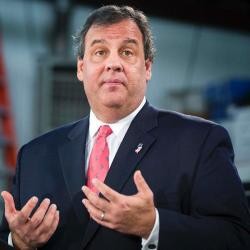US Appeals Court to Review New Jersey Sports Betting Case

New Jersey has been caught up in a costly legal battle over sports betting in the state for years, which has further been exasperated by a lawsuit filed against them by the NFL. In August 2015, the 3rd Circuit Court of Appeals in Philadelphia subsequently decided that New Jersey allowing sports betting would violate the Professional and Amateur Sports Protection Act (PASPA) of 1992, and so returned a 2-1 ruling against the state’s appeal.
Soon after, New Jersey requested that the Third Circuit should reconsider it judgment, and over the following few weeks State Senator Ray Lesniak, Governor Chris Christie (photo) and the New Jersey government have eagerly been awaiting its decision. That request has now been approved, and in a rare outcome for federal appeals courts, the case is set to be reheard, with a court statement reading; “The petitions for rehearing are GRANTED. The opinion and judgment entered August 25, 2015 are hereby vacated.” Following announcement of the news, an elated Ray Lesniak told the Washington Post:
“I’m jumping for joy. I would suggest everyone book their rooms in Atlantic City for Super Bowl week, because we should have sports betting by then.”
What the Ruling Means
After the 3rd Circuit Court of Appeals ruled against New Jersey, the state had the chance to ask for an en blanc ruling, a rehearing of their case in front of all 24 of the judges who sit on the 3rd Circuit Court of Appeals. Whether or not to allow for the ruling was up to the discretion of 11 members of the court. Most legal experts familiar with the case felt that New Jersey was unlikely to get a favorable ruling in their request for an en blanc because they have been ruled against five times already in their dispute with the NFL. Still, New Jersey beat the odds, as the 3rd Circuit Court of Appeals has ultimately decided to rehear the case.
Cautious Optimism
Now that the 3rd Circuit Court of Appeals decision to rehear is confirmed, many experts are cautiously optimistic that New Jersey may finally get the outcome they desire. At least six of the 11 judges on the review panel would have agreed to provide the en blanc ruling, so some feel that New Jersey already has six of the required 13 to win the en blanc on their side. Still, other experts state that agreeing to hear the case does not necessarily mean that the six judges will be persuaded to side with New Jersey when the actual hearing occurs.
What’s Behind the Court Case?
The lawsuit was brought against New Jersey by the NFL, as well as the NHL, MLB, NCAA and NBA, after the state gave Monmouth Park the ability to accept sports bets. The professional leagues and associations stated that sports betting would interfere with the integrity of professional and college sports. New Jersey argued back that Las Vegas casinos accept sports bets without interfering with the integrity of sports and that the leagues do not oppose daily fantasy sports betting. The case was heard by three different courts, all of which found in favor of the leagues.
New Jersey Pushing Investigation of Daily Sports Betting
The ruling on the New Jersey sports betting court case came around the same time that New Jersey lawmakers approached the U.S. Justice Department to urge an investigation into the daily fantasy sports betting sites FanDuel and DraftKings. The lawmakers of New Jersey as well as many other people feel that these sites are offering players the chance to gamble without any regulations in place. Those who follow gambling industry news will have to wait and see what the outcomes of both matters will be.
In the meantime, a 3rd Republican Presidential Debate recently took place at the University of Colorado, and included a brief discussion of the daily fantasy sports industry. Taking part in the debate was Florida Gov. Jeb Bush and New Jersey Gov. Chris Christie, and one of the questions asked by moderator Carl Quintanilla was whether the Federal Government should treat DFS as gambling and regulate the industry. Both candidates subsequently received applause for their answers, with Bush acknowledging some regulation was necessary, but most likely without the need for federal government interference. Likewise, Christie was equally critical of any government involvement in fantasy football, stating:
“We have, wait a second, we have $19 trillion in debt. We have people out of work. We have ISIS and al Qaeda attacking us. And we’re talking about fantasy football? Can we stop? How about this? How about we get the government to do what they’re supposed to be doing, secure our borders, protect our people, and support American values and American families. Enough on fantasy football. Let people play, who cares?”









